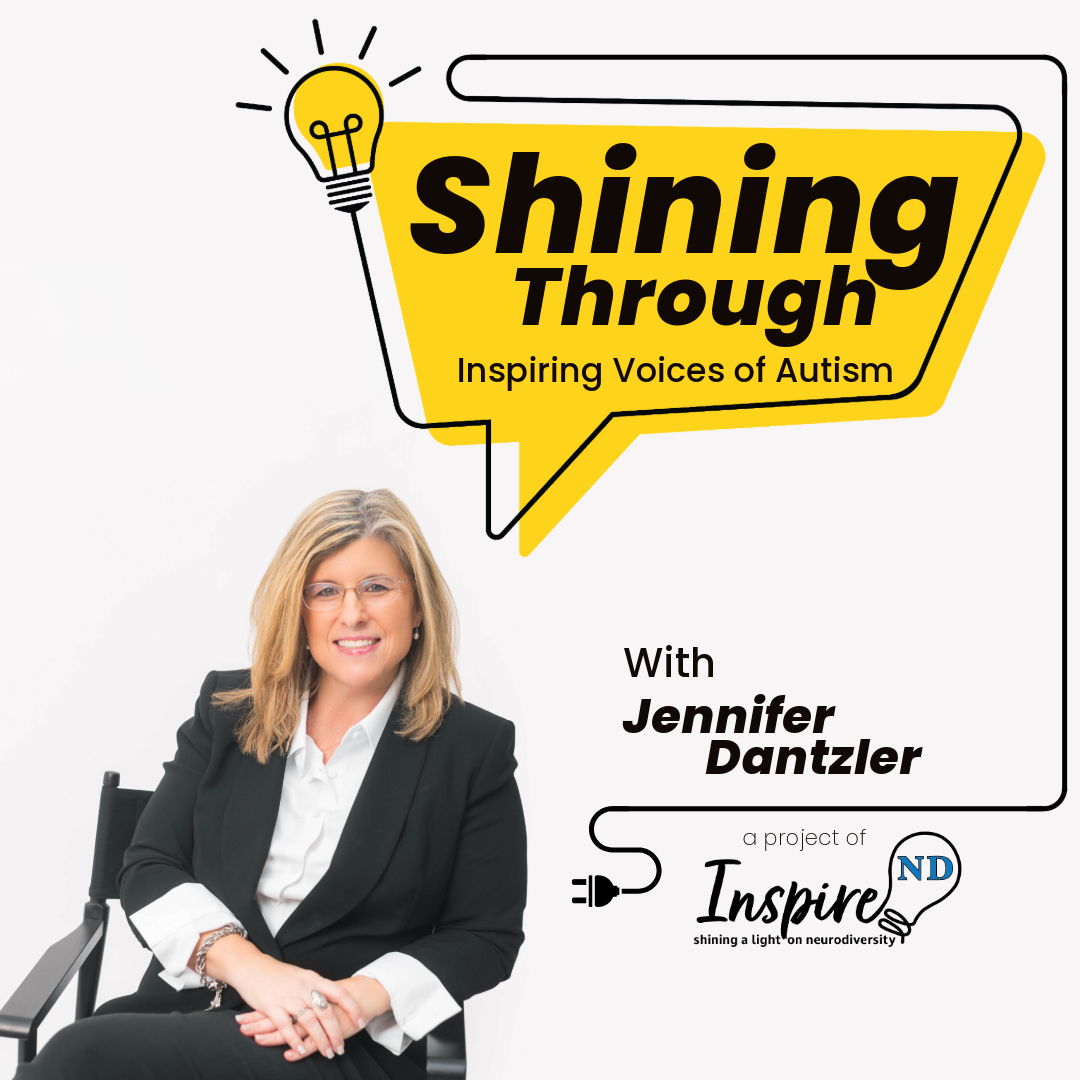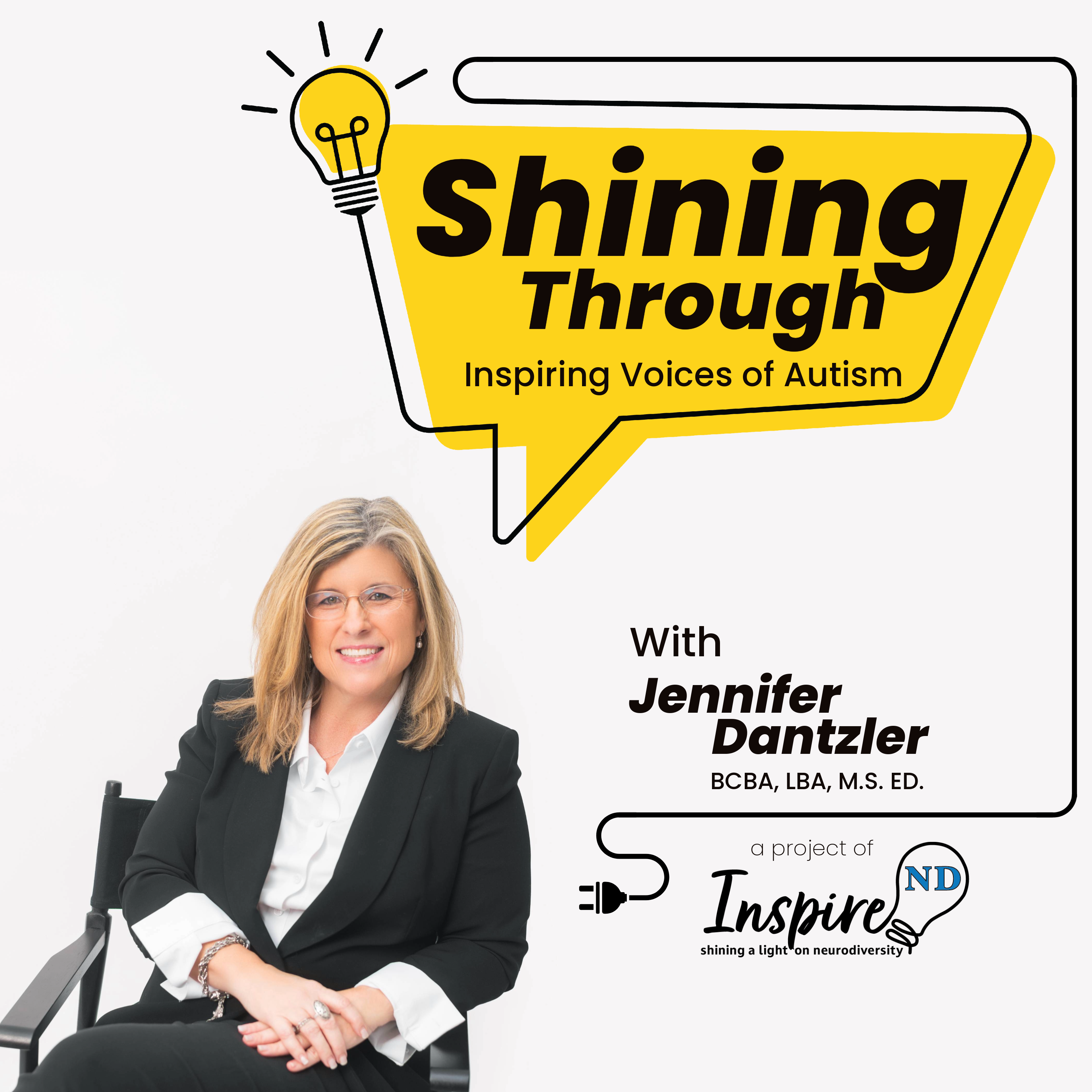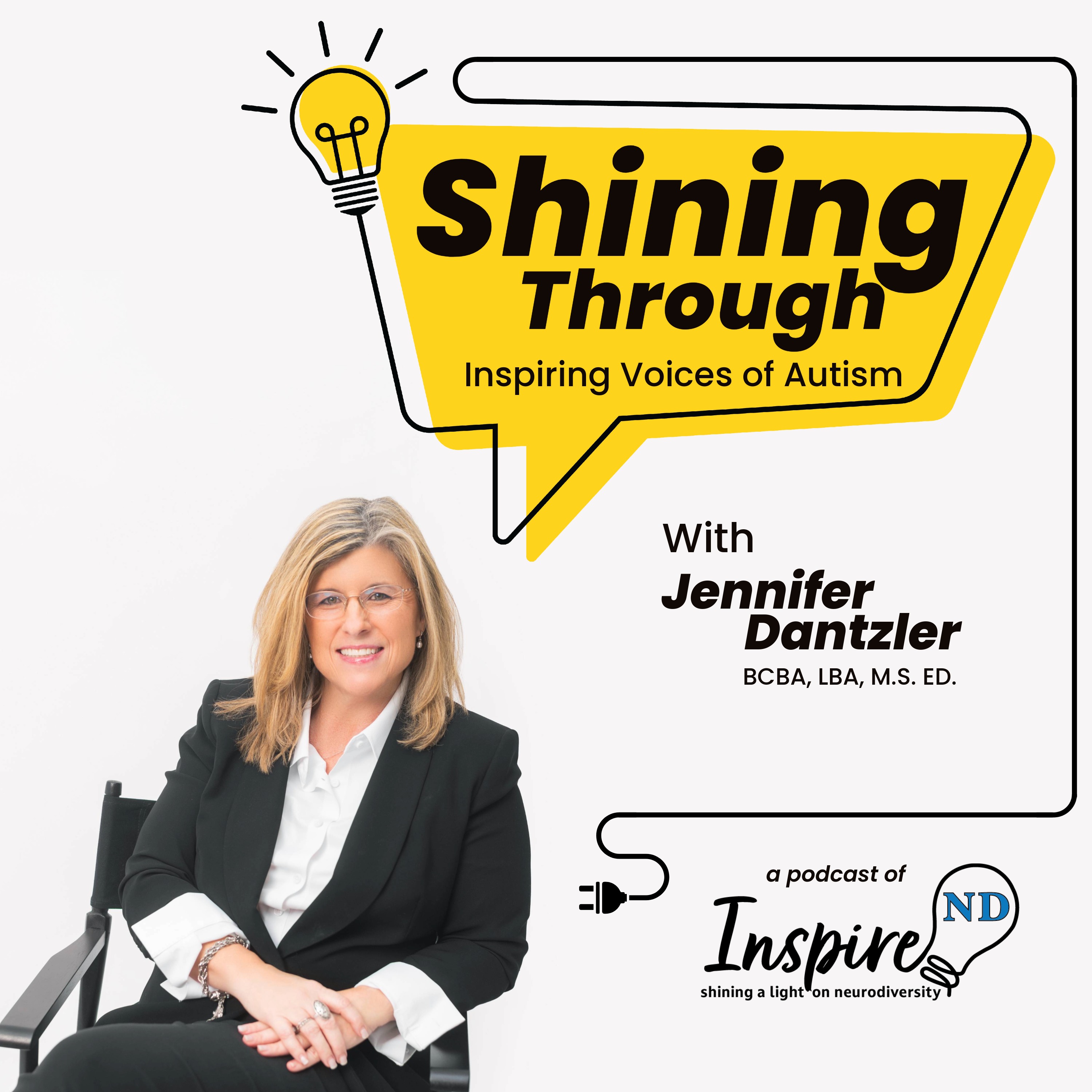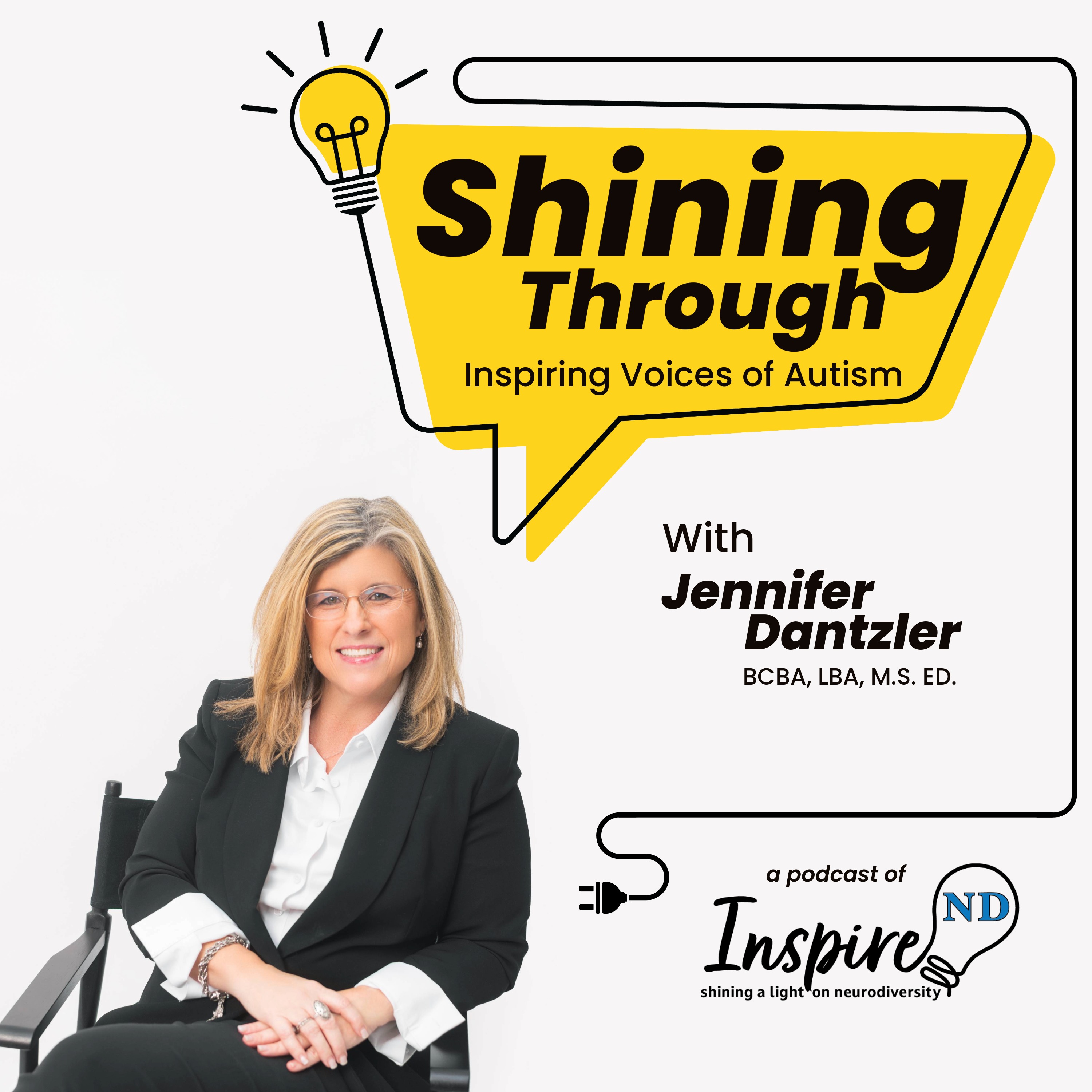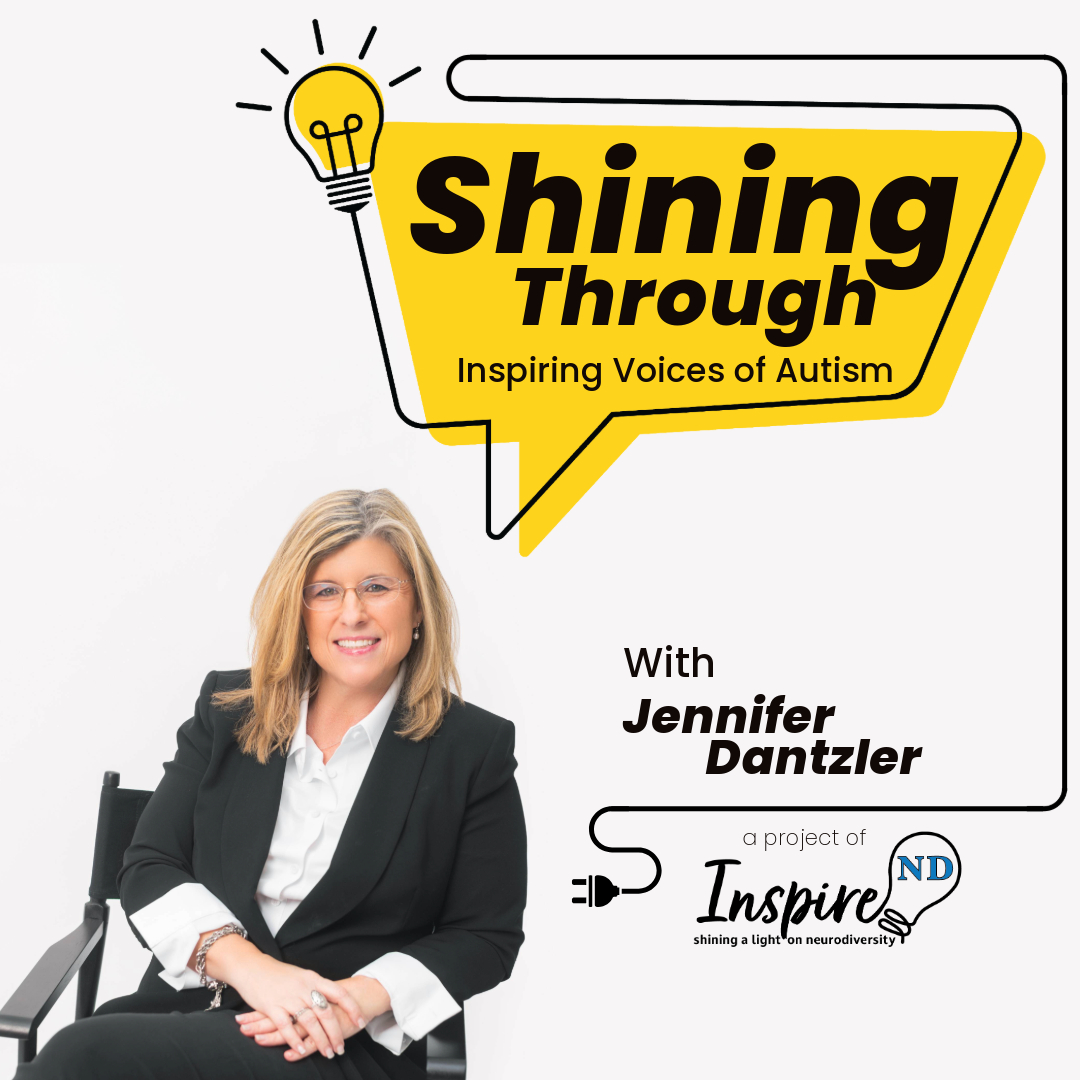[00:00:03] Speaker A: Welcome to Shining Through Inspiring Voices of Autism with show host Jennifer Dantzler. My name is Jack. I am in the autism spectrum and have Tourette syndrome. Thank you for taking the time to learn more about the world of autism. If you enjoy what you hear today, don't forget to subscribe to this podcast.
[00:00:20] Speaker B: Hey there everyone. This is Jennifer Dantzler, and I'm the executive director and founder of Inspire ND and nonprofit whose mission is to create truly inclusive communities through education and engagement. The goal of this podcast is to shine a light on real people and their stories in hopes of inspiring others who are on this journey of autism. Either themselves, their child, their loved one, their coworker. I truly believe ignorance is not bliss and we cannot be inclusive communities if we do not understand the people in the community. With autism now affecting 1 in 36 people, we need to get louder about this topic and that's our goal during this podcast. Podcast, we recognize that autism is a spectrum. There are a lot of people with a lot of different needs, a lot of resources available or none available. And we know that in every episode we can't meet everyone's needs for their specific interest. However, we hope that in each episode you do gleam some kind of insight as to how you can help your child or yourself be a better advocate. And as we go through our podcasts, our goal really is to address the entire spectrum, the various needs, the various environments that we're going to be in. And we hope that there's something in every episode for each one of you. So let's get started.
I'm here today with my friend Emily. I've known Emily for many years now, and so Emily is on the autism spectrum. And Emily's going to just continue to give us a little bit more insight to her journey, her challenges, and a lot of her victories. So, Emily, tell me a little bit about your diagnosis.
[00:01:56] Speaker C: I have high functioning autism spectrum disorder.
[00:02:00] Speaker B: Do you know when you were diagnosed?
[00:02:01] Speaker C: Approximately, I believe I was about 2 or 3.
[00:02:04] Speaker B: And when you were 2 or 3? I know mom and dad kind of got you into some therapies and things right away. What do you remember about when you were a child?
[00:02:14] Speaker C: I would often be dropped off adding kids in the morning and then they would take me to school in pre K and kindergarten. I would have be there half the day with my aide and then the second half the day I would go back to in kids and work on some stuff with them. I don't really remember much of it. I was like 3 and 5 and I don't remember much back then, but I do know that they helped me very much with my life.
[00:02:39] Speaker B: From your earliest memories that you do have, what were some of the struggles that you had in life, trying to.
[00:02:45] Speaker C: Fit in with the kids? And I never understood why I was so different.
[00:02:48] Speaker B: Did your mom and dad talk to you about your autism, and what do you remember about that?
[00:02:53] Speaker C: I didn't get told that I was autistic until I was about 10 years old. So during those early times, I didn't know that I was autistic. I actually thought that it was normal for someone.
[00:03:04] Speaker B: You were in school and you had support, and you kind of just assumed everyone had support, but you were just part of the program, and that's really all you knew, and that was just the way of life.
[00:03:13] Speaker C: Yes. And I remembered having so much fun. You guys helped me so much.
[00:03:16] Speaker B: And when you were diagnosed at around the age 10, do you remember what your mom and dad said to you?
[00:03:22] Speaker C: My mom had me shred paper, and then I saw a document that had me diagnosed with autism. I'm like, okie dokie.
[00:03:28] Speaker B: Interesting, because it was from before you even knew that you had autism.
[00:03:33] Speaker C: My parents sitting down talking to me, and I just looked at them and said, I know. I saw. When I was shredding paper.
[00:03:39] Speaker B: Oh, so you had seen the paper before? They told you jokes on them?
[00:03:45] Speaker C: Yeah. I'm like, yeah.
[00:03:47] Speaker B: So when you saw that paper, though, what did you think? Did you even know what that meant?
[00:03:52] Speaker C: I didn't really know what that meant. I'm just like, well, this kind of makes sense. Like, I only saw what autism was from a book, and I didn't even remember the definition. But I, of course, know more about what autism is now. But, yeah.
[00:04:05] Speaker B: So when they first talked to you, did it answer some questions for you? Did it make you feel worse? Did you make it feel you feel better and relieved? How did it make you feel?
[00:04:12] Speaker C: From what my parents told me, I felt really negative from what another student told me. But as I learned more about it, I felt a little bit more better about myself. It doesn't mean anything good or bad, just different. Like, I often think about the brain of autism. It's not broken. You just have different gears. I think of it as a brain is a factory. The machine isn't broken. It just has different gears and wires and stuff that.
[00:04:36] Speaker B: I couldn't have said it better myself. I really appreciate that, Emily. And I think this is a good lesson for other parents out there, because I think there are. Sometimes parents are afraid to tell their child because they're afraid it will make them feel bad or they're afraid they're going to get judged. But from what you're saying, it actually answered some questions for you, and it was almost a little bit of a relief because you don't know what you don't know, and sometimes that's scarier in life than knowing. And to your point, then after that, you learned more about it. You learned what you meant. More importantly, you learned what it didn't mean. Right? Correct. So I think that's really important for. For parents to hear. Growing up, what was probably the hardest thing for you?
[00:05:17] Speaker C: Feeling different from everyone else and feeling like you don't fit in. I'm like, sometimes I was just like, why can't I be like everyone else? But then there was also times like, I'm glad I'm different from everyone else. And then there was also the sensitivities of. Of loud noises and sounds during fire drills. I felt like everyone was looking at me whenever I was covering my ears. And I was also kind of thinking at first, why doesn't everyone else freak out when the fire alarms go off?
[00:05:41] Speaker B: Yeah. Yeah. So what have you done over the years to learn how to cope with some of those things?
[00:05:45] Speaker C: During middle school and my early high school years, I went to in kids to talk about how I felt with autism and help figure out strategies. And I'm in therapy right now, not with inkids, but a therapy to help talk about things whenever I'm sad or annoyed or things like that, and how to feel different, what to do when I feel new feelings.
[00:06:05] Speaker B: That's awesome. That's been very proactive, and I've always said I think it should be mandatory that everyone be in therapy because it's, It's. It's helpful. When you meet people, do you tell people about your autism?
[00:06:18] Speaker C: I typically wait until I get to know them more. And whenever the moment just feels right, I just say it. Sometimes I'm just like, hey, I got to tell you something. Or I'm just like, well. And sometimes it just slips in the conversation. Well, I'm autistic, so it's like, has.
[00:06:32] Speaker B: It ever backfired on you? Like, where someone's rejected or then treated you differently?
[00:06:37] Speaker C: But one time a girl told me, I can't remember why, but I said, but I told you I was autistic. And she said it was kind of obvious. And that's when I realized it might be obvious to some other people. But I've also had some other people say, I never Would have known.
[00:06:50] Speaker B: Mm. Yeah, exactly. So tell me about some of your victories. Like how did I already ask? How old are you?
[00:06:56] Speaker C: I am 21. I'll be 22 next month.
[00:06:59] Speaker B: Months. Okay. Very exciting. Happy early birthday.
[00:07:02] Speaker C: Thank you.
[00:07:02] Speaker B: So what are you doing in life right now?
[00:07:04] Speaker C: I am about to graduate with an associate's degree in performing arts at Lone Star College in Kingwood. I am working at a little salon in Kingwood called Shears in Action. I'm so grateful to work with the woman. Her name's Mary Kay and she's amazing.
[00:07:20] Speaker B: Yes. Shout out to Shears in Action. They are awesome.
[00:07:24] Speaker C: I just finished up a theater production called Sea Dog at a program called Curtain Call Cafe. And I'm also in voice lessons. And I'm getting ready to audition for a musical called Seussical at Christian Community Theater next month.
[00:07:40] Speaker B: I seem to remember also, you might have written your own short play and performed in it, I believe.
[00:07:47] Speaker C: Yes, I wrote a short play last year called the Backyard. It was kind of basically a family moving in to their house and deciding what to do with their backyard, but it's told through the eyes of the animals and two flowers.
[00:08:00] Speaker B: That I remember. That was such, such a great show. What do you like about acting? Why do you like to act?
[00:08:06] Speaker C: The moment I did my first play in elementary school, I just got drawn to it.
[00:08:11] Speaker B: Yes.
[00:08:11] Speaker C: I'm honestly never really sure why, but it just made me happy, just made me feel better. And during those times where I just. There are times in my life where I just didn't feel like myself. Acting made me feel better so I can be, like, be someone else. I don't feel like that anymore, but it's just something that always made me happy.
[00:08:32] Speaker B: What would be your ideal job?
[00:08:33] Speaker C: I would love to be an actress or an author.
[00:08:36] Speaker B: Those of you out there who need some kind of writer, show playwright or actress, Emily is your girl. Reach out to infopirend.org and we can get you connected. What is something that you want to tell parents of maybe a newly diagnosed child with autism?
[00:08:53] Speaker C: You are going to be okay. Different does not equal bad. Doesn't matter what people say. And instead of telling them, don't do that. Well, unless it's something like super dangerous or life threatening, ask them why they do that certain thing that's different. Don't just be like, don't do that because it's different unless it's life threatening. But.
[00:09:13] Speaker B: But really the point is to try to help understand why they're doing what they're doing so that they can determine if it's something that really, it may be something you need or something you want, and if it's something that is inappropriate, how can we replace it with something that is appropriate but still meets your need?
[00:09:29] Speaker C: Correct.
[00:09:30] Speaker B: Right.
[00:09:30] Speaker C: Sometimes I did different things to, like, fidget or as some people call nowadays, stimming. When I was younger and I still kind of do this today, I would walk around in circles. I would just get up, stand up, and just walk or run. Mostly walk or speed. Walk around in circles. And that's how I thought or daydreamed. And my dad did not understand why I did that. Eventually met this wonderful person that you probably know the name Temple Grant, and he asked her, how do I get my daughter to stop doing this? And instead of telling her how to stop him, she asked him, ask her why she does it. So instead of, like, how to stop it, figure out why she does it. So after my dad got that advice from Temple grand and he saw me do Going in Circles Again, he asked me, what are you thinking when you do that? And I said, I've been thinking of three different book ideas. And that's the moment he realized that it's not about how they can change the child, but how can they change themselves to help their child reach their fullest potential?
[00:10:32] Speaker B: That's pretty profound. First of all, you do drive?
[00:10:35] Speaker C: Yes. I don't have my license yet, but I am currently learning how to drive with my mom. It's awesome. I'm starting to feel more better about driving. Like, when I first started, I was, like, so nervous because I was like, don't go too fast. Don't run into this. Don't run into that. But now I'm getting more comfortable.
[00:10:52] Speaker B: That's great. Practice. Practice makes perfect, right?
[00:10:54] Speaker C: Yep.
[00:10:54] Speaker B: Okay. What are you looking forward to in the future?
[00:10:57] Speaker C: How I can inspire others, whether they are autistic like me or whether they just are going through a lot and need something to help them power through whatever they're powering through. No matter what I do, that's what I do in life. That's what I want to do, is inspire others.
[00:11:11] Speaker B: And I don't know that there's anything else I can say to end better than on that note. So, Emily, we truly thank you for being here. I know for a fact you absolutely have inspired others. I appreciate you being vulnerable and open and sharing part of your journey, and I have a feeling we'll have you back again.
Part of what we teach in the world of ABA is flexibility, so we're pivoting a Little bit. And you just heard my friend Emily talk a little bit about her journey with autism. And sitting in the room, was dad listening? Proud dad, yes. And I think he only had one or two little happy tears. And so we decided, though, that we're going to add on to Emily's and get Dad's perspective on this, too, while we're all sitting here and talking about it, and it's fresh in our minds. So, Greg, thank you for being here.
[00:11:57] Speaker D: Thank you for having us.
[00:11:58] Speaker B: Thank you so much for spending all this time contemplating all the questions, because you got no warning. Congratulations, mom and dad and grandparents. You've done an amazing job raising Miss Emily over there. I know it's been a lot of hard work for you, so shout out to you all. Secondly, was there anything in what Emily said that surprised you?
[00:12:18] Speaker D: She's very humble. She works so hard, and she just focuses on, not just herself, but she focuses on other people first. And with doing that, she starts teaching herself. And she's just such a caring person. And it's just. She left that part out. That's the only thing.
[00:12:34] Speaker B: Okay, so she was very humble. Love it, love it, love it. Talk a little bit about when she was first diagnosed, your journey with that diagnosis.
[00:12:42] Speaker D: You know, when we first found out we didn't know what to do. The only thing that we had heard, I mean, we just, you know, read a couple of different things. Unfortunately, I had found a. A friend that had a son with autism, so I was able to ask Clint a lot of questions about what he was doing and what we could do. But we really like a lot of parents that find out that their child is affected. We didn't know what to do. So we were very fortunate to find Jennifer and where she was. I mean, we didn't really know what to do. So fortunately, we found somewhere that could help her and did help her well.
[00:13:14] Speaker B: And I think that's an important piece as we talk to parents, because I know it can be very overwhelming when your child's first diagnosed and you can have, you know, paralysis with that. And if there's nothing else to say other than just get started, right, it might be the right thing, it might be the wrong thing, but just get started somewhere.
[00:13:31] Speaker D: And you're exactly right. I mean, it's. When you find out as a parent that you have a child with autism, first thing you do is you blame yourself. And then you go into your own little island because you don't know what to do. You're almost helpless. But to your point, you just said You've got to do something. Don't wait. It's not going to go away. And that's not a bad thing. It's a bad thing if you don't do anything with it.
[00:13:52] Speaker B: Okay, Right. Great perspective. So as she was growing up, how did you guys make decisions about what therapies to do or what to start, what to stop, where to have her?
[00:14:03] Speaker D: Linda, my beautiful wife, she's the one that really made those decisions. She was capable of doing that. It was all from the heart. And fortunately, she pushed all the right buttons.
[00:14:13] Speaker B: And I think that's the other piece, too. I always try to encourage parents is follow your gut.
There can be a lot of articles, a lot of newspapers, a lot of the latest and greatest. And I know for parents it's hard because you have to discern all that, but there's something about just that mommy and daddy gut that you just have to follow.
[00:14:31] Speaker D: I mean, it is. You have to go with your gut. And the. The women's intuition is a lot stronger than the man's, from what I understand. But what's really important with a lot of people, and I still talk with a lot of parents these days. Talk to someone. If you don't, then you don't know where you're going to go. Talk to people that have been through this and that helped us tremendously by talking to other parents and being open to it. I mean, you're not going to find these answers out by yourself. And please do not go online and try to figure it out. That's one of the first things that Clint told me as well.
[00:15:01] Speaker B: Yeah, that's a really good point, because it's very easy to do. So let's talk a little bit about when you did tell her she had autism, because I do remember us having that conversation. And you didn't want to do it because you were nervous, right? You're nervous about how she would react, how she would feel, would it put a cap on her or her way of thinking? So talk a little bit about that journey.
[00:15:24] Speaker D: That was a very difficult conversation. Well, it started out when we were having lunch, I believe, at Saltgrass, and you wanted her to speak at one of the galas. And you looked at me and you said, well, have you. You haven't told her? And I was like, oh, my gosh. I got to pretend like I didn't hear that. But no, we hadn't told her. We didn't know how to tell her. I didn't ask for guidance, and you didn't provide any. And so I went home and I told Linda that we need to tell her. And I said, you know what? It's Tuesday. Let's tell her on Friday. That was probably the first week that Linda and I didn't want to talk to each other. And we didn't talk to each other the whole week because we were afraid the other one was going to have the other one tell her that she had autism. So we really didn't know how to do it. Friday came, and all of a sudden, we just. We had the conversation. The conversation, from my memory, was we walked her through chronologically, her schooling. It's like, okay, you went here. This is where Logan had gone to school. This is where you went. Do you know why you went there? She said, no. I was like, well, we told her that she has a gift from God, and that's called autism. Just like your brother can throw a baseball really hard, God has given you something extraordinary, almost a superpower in your brain to figure things out. Because the first thing I asked her is, do you know what autism is? And she kind of got sad. And she alluded to it earlier, but she said, it's where you're different and people don't necessarily like you. That was the definition that she had received from her, quote, friends, or we won't call them friends from people at school. And so fortunately, her mom gave her the right and proper definition of what the word autism means. It is. It's a superpower. The things that she can do with her brain and her memory and figure things out and the caring nature that she has is something that a lot of people really would want.
[00:17:05] Speaker B: Well, and to that point, I don't know how many of us can sit here and say, we wrote a play. Like, I mean, she's already achieved more in life. And I think part of what also always blows my mind when I see people on the spectrum is the things that you and I take for granted that come so easily, they have to work at so much harder, but they do. And I can tell you firsthand, Emily does it with grace. And we all should just take a page out of her book, right? About how you go after life. And it might look a little different. As she said, it might be in a different way than the average person might learn that. Or it might take a little longer for driving. But I can tell you there are many teens in this day and age that are not driving at 16 and 17.
And so it's. It's not a big deal. It might take a little longer. And so what Is something that you have learned from Emily.
[00:17:57] Speaker D: Never give up. She just keeps going. Keeps going. She gets upset and she keeps going. I mean, just her tenacity to just continue to move forward and not give up is something so many people could learn from. She just doesn't. She doesn't know how to give up. And she's inspiring. Yeah, she just is. And that's what she does. Well, she's already admitted that, but she's also. I mean, she opened up that. And I will never forget being a better parent and having a better family because I realized that something I wanted her to stop doing because I was uncomfortable with it and going around in circles around that coffee table and her coming back. It was the first time that I wanted her to do it so I could ask her, because I was. All of a sudden, I was curious, and she told me, and I was like, okay, you know what? I'm going to ask you a favor. The next time you want to get up and go ahead and do that, I go first, tell me about what's exciting you, Then go ahead and do it. And she started doing that, and our relationship changed because of that. She has taught me how to be a better father.
[00:18:58] Speaker B: Wow. Very profound. Very profound. So you kind of already said it, but what would be one thing that you would want to tell parent of a newly diagnosed child?
[00:19:08] Speaker D: Stay close with your other parent. You have got to talk. And that's something that Linda and I have been together for now 33 years. You want to talk about making your marriage stronger? Is talking through these things. Just like I said, we didn't talk at all because we were so afraid of what we were gonna. How are we gonna tell Emily? We had so many talks at night when everyone was asleep, and it brought us closer. So many people either want to blame themselves and not talk to the other, and so many people, it's. That's the most important thing, is to talk to your spouse. It's a rough road because you don't know where you're going, but it's going to turn out okay.
[00:19:43] Speaker B: What's something that excites you about Emily's future?
[00:19:46] Speaker D: Excitement is every day when I get up and see that smile and asking her what she's going to do today, because it's limitless. It really is. She can do whatever she wants to do. I mean, before we met you being told by a. I'll call it a therapist, but they said that she would never speak.
[00:20:03] Speaker B: Wow.
[00:20:03] Speaker D: Like, she will never speak. She will never go to school without an aid. No, no. It was. She will never speak. She'll never go to public school. She'll never go to public school without an aid. And then she graduates from Kingwood High School with no aid, in the top third of her class.
Do not believe they can't do it.
[00:20:20] Speaker B: And is now graduating with her associates and is an actress and has been an acting coach and has written a play and is driving and is taking on the world.
[00:20:30] Speaker D: Exactly. And we did not tell her that there was limits. She didn't know there were limits. I mean, she could do puzzles and still can faster than I can. But you know what? Oh, you have autism. Don't worry. No, it's like people are like, oh, you have a daughter, Blossom. Oh, I'm sorry. I was like, why are you sorry? My daughter has a higher IQ than both of us put together. It's like, why are you sorry? Oh, well, yeah, it's just. She is absolutely awesome.
[00:20:51] Speaker B: That is a lot for us to think about, a lot for us to aspire to be in to do. So thank you, Greg, for being here. I know it was spur of the moment. I appreciate your flexibility, but it's just. It's too good. It's too good of information. So she's very easy to talk about.
She is. Thank you all for listening. If you need help or resources, whether you're a parent, someone on the spectrum, a business or a community organization who want to know more or need help or want to share resources, please reach out to
[email protected] do you know the.
[00:21:25] Speaker E: Most important factor in your company's success? It's your people. They're the heart of your business. So how do you harness this potential? Insperity can help. From recruiting and onboarding to employee development and retention, we'll help you build a stronger, more resilient organization. See the difference the right approach to human resources can make? Because how you HR matters? Find out
[email protected] Inspector HR matters.
[00:21:53] Speaker A: Thanks for joining us on Shining through inspiring voices of autism. If you enjoyed this episode, be sure to subscribe, leave a review and share with others who want to celebrate neurodiversity. Until next time, keep shining.
